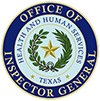Fraud Analytics and Data Operations
Fraud Analytics and Data Operations implements tools and innovative data analytic techniques that streamline OIG operations and increase the identification of potential fraud, waste and abuse. Team members assess trends and track the behavior patterns of providers, clients and retailers to identify the potential misuse of Texas Health and Human Services programs.
Fraud Analytics
Fraud Analytics is responsible for performing advanced data analytics to identify trends and patterns that might be indicative of potential fraud, waste and abuse to help drive investigations, reviews, audits and inspections. Fraud Analytics develops complex algorithms and models to analyze the behavior and billing practices of providers, clients, and managed care organizations.
Data Operations
Data Operations oversees data management functions, business intelligence solutions, and provides data system support to the OIG. Data Operations is comprised of three units: Statistical Analysis and Data Visualization; Data Research and Support; and Data Intelligence.
Statistical Analysis and Data Visualization
Statistical Analysis and Data Visualization develops sampling, extrapolation, and statistical models to support OIG investigations, reviews, audits, and inspections. The unit is also responsible for the design, development, and maintenance of OIG data visualizations and operational dashboards.
Data Research and Support
Data Research and Support performs all data queries and analysis, data validation, and population development using various data systems, which includes coordinating with external partners and payers for OIG investigations, reviews, audits, and inspections. This unit is also responsible for vendor coordination, reporting, and oversight of OIG technology systems.
Data Intelligence
Data Intelligence researches, collects, and analyzes information and data related to potential fraud, waste and abuse in the delivery of Texas health and human services to determine if misuse has occurred and to inform the OIG on specific areas of focus.

